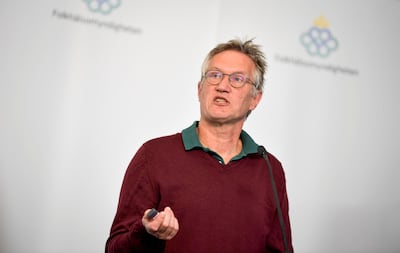Sweden’s controversial ‘herd immunity’ strategy to combat Covid-19 is beginning to gain traction elsewhere in Europe.
Since the onset of the pandemic, the Swedish government has averted any lockdowns and instead used campaigns to emphasise personal responsibility to socially distance and keep good hygiene. It also recommended the most vulnerable people to attempt to ‘shield’ from the virus.
Sweden’s death rate is high compared with its Scandinavian neighbours.
According to the European Center for Disease Control, as of September 20, Sweden had reported 30.3 new COVID-19 cases per 100,000 inhabitants in the previous 14 days, compared with 292.2 in Spain, 172.1 in France, 61.8 in the U.K. and 69.2 in Denmark, all of which imposed strict lockdowns early in the pandemic.
Overall, Sweden has 88,237 reported infections and 5,864 fatalities from the virus, or 57.5 deaths per 100,000 inhabitants since the beginning of the crisis.
Sweden’s chief epidemiologist Anders Tegnell has blamed the country’s high death toll on its success in dealing with the winter flu outbreak. Overall, it has recorded more than 89,000 infections and 5,876 deaths from coronavirus.
Both infection and death rates have dramatically fallen over recent months. For the past seven days, Sweden’s daily average of new cases is 297, compared with thousands in other European countries such as Britain, France and Spain. Its average number of deaths for the past week is one a day.
The herd immunity theory says that if at least 60 per cent of a population contract the virus, the whole population develops immunity to it, slowing down its transmission.
The tactic was not a popular one, and Sweden was seen as something of an anomaly. Although other European countries, notably Britain and the Netherlands, flirted with using the herd immunity strategy, both ended up abandoning it because of pressure from health officials and the public.

Most of Europe’s other countries chose instead to enter into lockdown and in countries such as Britain, France and Spain, new Covid-19 cases are escalating while their economies are struggling.
Despite initial scepticism, Ireland is one of the nations exploring herd immunity. On Wednesday, Ireland’s Dáil’s Covid-19 committee was advised to let coronavirus be spread among people under 60 in a controlled way.
Sweden’s former chief epidemiologist Dr Johan Giesecke suggested Irish legislators allow the virus to spread through the population while the “old and frail” are shielded and care home staff and residents frequently tested.
The epidemiologist said that the Irish government should not build its strategy around the assumption that a vaccine would arrive quickly, adding that Sweden’s “soft lockdown” worked because the government trusted the public to adhere to the rules.
“We might have to wait for it and it may not be very effective in those who need it most,” Dr Giesecke said of a potential vaccine.
One leading scientist at the University of Oxford has said the latest UK restrictions suggested “a move towards Sweden”, as there is more focus on personal responsibility and acceptance that cases will rise.
Carl Heneghan, director of the Centre for Evidence Based Medicine at Oxford, claimed a “shift in policy” was emerging from the government.
“If you look at some of the policies, what you’re starting to see is a move towards Sweden,” he told the BBC. “When you look at bars and restaurants, that’s the policy there – they have table service.
“So what I’m hoping we now start to see is a more coherent, consistent policy … there will be an inevitable rise in cases as we go into winter. The key is not to panic. If we panic, we’ll talk ourselves into lockdown.”
However, many ministers still are quick to distance themselves from the controversial herd immunity approach.
British Foreign Secretary Dominic Raab on Wednesday denied that the UK government is shifting to an approach similar to Sweden’s.
“I don’t accept that characterisation,” Mr Raab said.
“We’ve just introduced a suite of changes. The one thing I would accept is that we as individuals have got some responsibility to comply – it’s not just what the government does that matters.”
The way Sweden’s strategy was viewed outside the country seems to depend largely on what stage of the pandemic the observer was experiencing at the time. Initially, many abroad were incredulous at images of Swedes dining with friends in restaurants or sipping cocktails on the Stockholm waterfront. Some were envious that Swedish businesses were not forced to close.
Then came shock as the virus ripped through the country’s nursing homes and hospices.
By mid-April, more than 100 deaths were reported each day in Sweden, while mortality rates were falling elsewhere in Europe.
A Swedish government commission investigating the handling of the pandemic will, undoubtedly, have hard questions to answer: Did authorities wait too long to limit access to nursing homes, where about half of the deaths occurred? Were they too slow to provide personal protective equipment to staff in those homes when shortcomings in the elderly care sector had long been known? Why did it take so long to set up wide-scale testing?
But in neighbouring Denmark, a leading virologist said there was growing evidence to suggest Sweden’s strategy had been successful.
"There is some evidence that the Swedes have built up a degree of immunity to the virus which, along with what else they are doing to stop the spread, is enough to control the disease," Kim Sneppen, professor of biocomplexity at the Niels Bohr Institute in Copenhagen, told Denmark's Politiken newspaper on Monday.
“That is what they have said. On the positive side, they may now be finished with the epidemic."
